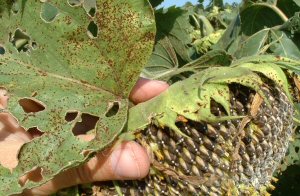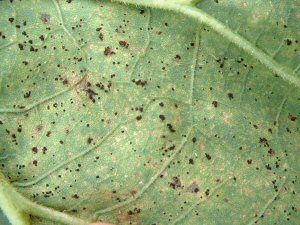Rusts
Early infection of susceptible varieties can cause serious reduction in seed yield and oil content. Later infections cause less damage. Late planted fields of susceptible hybrids are generally more severely damaged by rust than earlier planted fields.

Figure 1

Figure 2
Host Crops
Sunflower, wild sunflower
Biology
Sunflower rust spores overwinter on the debris from infected sunflower leaves and stems. In the spring, the spores germinate to infect volunteer seedlings, wild sunflowers or new young plants in nearby fields.
Spore production and infection continuously occur. This "repeating stage" is the most damaging with spores being spread by wind to other fields. As the crop ripens, the spores form the overwintering stage which can re-infect next year's crop.
Rust multiplies rapidly during warm, moist weather. High nitrogen levels and abnormally high seeding rates promote excessive foliage. This, in turn, increases the humidity within the canopy and favours rust development.
Symptoms Of Damage
Early symptoms on volunteers and seedlings appear as small, orange-brown spots on the upper surfaces of leaves, followed by spots appearing on the lower surfaces of leaves (Figure 2). A heavy infection can cause the entire leaf to die. Rust spots may also be found on the stems, petioles, bracts and back of the head (Figure 1). In late July or early August, rust appears as dark-brown, dusty pustules on surface of the leaves, leaf petioles and the back of heads. This is the most damaging stage of rust infection during the season. The black pustules of over wintering spores will be found on all plant parts towards the end of the season.
Scouting Techniques
Look for dense masses of brown, powdery pustules that are scattered on all of the green parts of the plant, especially the leaves. Heavily-rusted leaves appear withered.
Economic Thresholds
None available.
Control Tips
- Grow rust resistant varieties. Most oilseed and confectionary hybrids have good to excellent resistance to most races of rust.
- Rotate to other crops. Destroy wild sunflowers or volunteer sunflowers. Early seeding may minimize the disease.

